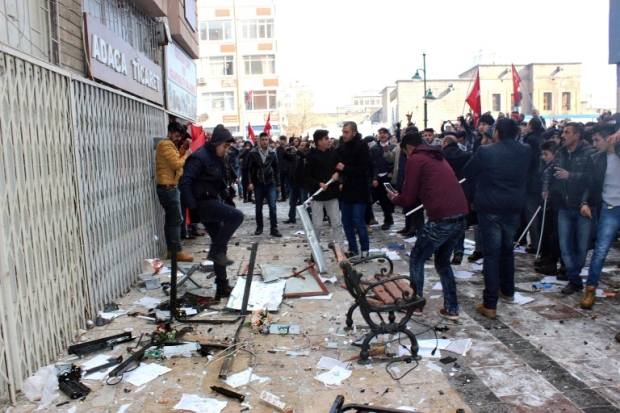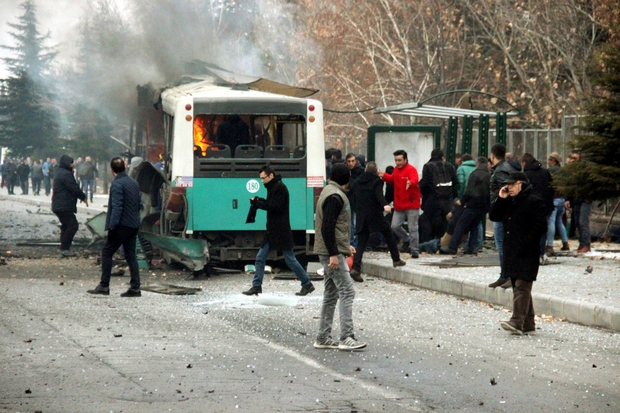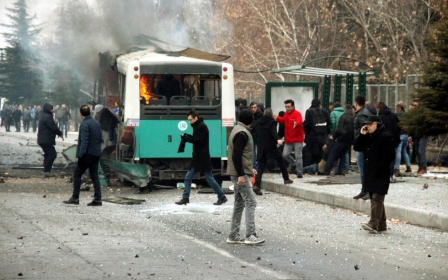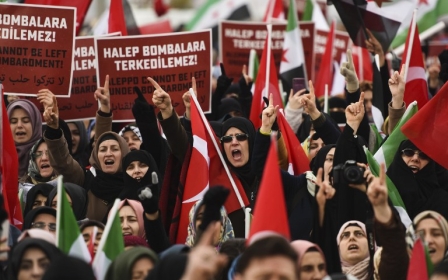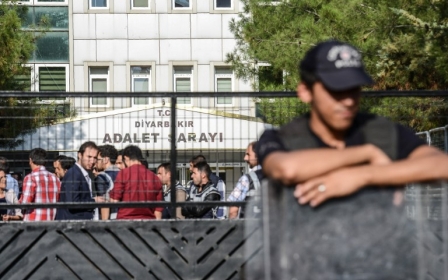Protesters storm pro-Kurdish party local HQ after Turkey attack
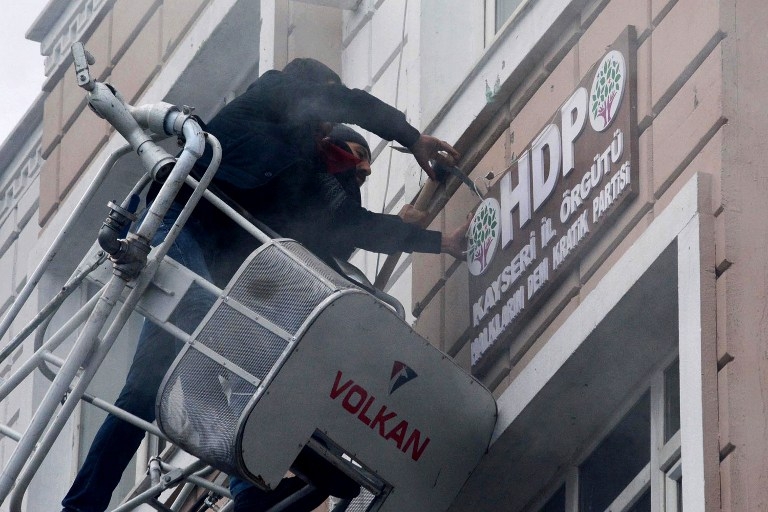
Dozens of nationalist protesters on Saturday stormed the headquarters of the pro-Kurdish Peoples' Democratic Party (HDP) in the central Turkish city of Kayseri after an attack there that left 13 soldiers dead, images showed.
The protesters broke into the building where the office is located, scattering papers and furniture on the street and removing the HDP sign from the entrance, images taken by the Dogan news agency showed.
A group then went to the top of the building, set off a fire and draped from the top a large red flag with three crescent moons, the insignia of right-wing Nationalist Movement Party (MHP).
The government has said the outlawed Kurdistan Workers' Party (PKK), which is fighting an insurgency against the Turkish security forces in the southeast of the country, was likely behind the attack earlier.
The attack came after thirteen Turkish soldiers were killed and dozens more wounded Saturday in a suicide car bombing blamed on Kurdish militants who targeted off-duty conscripts.
The government said all signs so far suggested the the outlawed Kurdistan Workers Party (PKK) was behind the bombing in the city of Kayseri, a usually calm industrial hub in the heart of Anatolia.
Interior Minister Suleyman Soylu said a total of 56 people were wounded, half a dozen of them seriously, and that seven people had been detained on suspicion of involvement while five more were on the run.
Television pictures showed the bus reduced to a smouldering wreck by the blast, which came a week after 44 people were killed in a double bombing in Istanbul after a football match. That attack was claimed by Kurdish militants.
"All indications at present point to the PKK," Deputy Prime Minister and government spokesman Numan Kurtulmus told NTV television.
He said that the materials used in the bombing were similar to those used in the Istanbul attack last week. "You don't just buy these at the shopping mall... there is a logistical support," he said.
Prime Minister Binali Yildirim said that the attack was carried out by a "suicide bomber", without giving further details.
HDP condemns Kayseri attack
The HDP denies any links to the PKK, but the government accuses the party of being the political front of the militants. Several HDP MPs, including its co-leaders, are under arrest over alleged links to the PKK.
The HDP earlier condemned the attack on the soldiers "in the strongest possible terms".
It added: "We have long passed the stage of settling with messages of condemnation. We all must stand together for peace, democracy, justice and freedom against violence, to end this pain."
Turkish media said that Saturday's protesters were supporters of the Grey Wolves, a militant wing of the MHP that was prominent in the 1980s and 1990s.
Kayseri is seen as one of the strongholds of the nationalist party in Turkey, although the ruling Islamic-rooted Justice and Development Party (AKP) has made inroads there in recent years.
'National mobilisation'
President Recep Tayyip Erdogan said that the "acts of terror" in Turkey were "aiming at all 79 million of our citizens together with our soldiers and police."
Without referring specifically to the Kayseri attack, he said that Turkey was targeted by all terror groups but especially the PKK.
"We will fight decisively against these terror organisations in the spirit of a national mobilisation," he said.
Turkey has seen a spate of deadly bombings in a bloody 2016 blamed both on Islamists and Kurdish militants that have left dozens dead and put the country on daily alert.
In June, 47 people were killed in a triple suicide bombing and gun attack at Istanbul's Ataturk airport, with authorities blaming the Islamic State group.
Another 57 people including 34 children were killed in August in a suicide attack by an IS-linked bomber at a Kurdish wedding in the southeastern city of Gaziantep.
Kurdish militants have twice struck with bombings that killed dozens in Ankara in February and March.
The attacks have come with the civil war still raging in neighbouring Syria, where Turkey is staging its own incursion to expel jihadists and Kurdish militia from the border area.
Turkey is also still reeling from a failed 15 July coup blamed on the US-based Islamic preacher Fethullah Gulen, which has been followed by a relentless purge of his alleged supporters from all state institutions.
Meanwhile, angry right-wing protesters also attacked an outdoor meeting of the the opposition Republican People's Party (CHP) in central Kayseri, the Hurriyet daily said.
New MEE newsletter: Jerusalem Dispatch
Sign up to get the latest insights and analysis on Israel-Palestine, alongside Turkey Unpacked and other MEE newsletters
Middle East Eye delivers independent and unrivalled coverage and analysis of the Middle East, North Africa and beyond. To learn more about republishing this content and the associated fees, please fill out this form. More about MEE can be found here.


